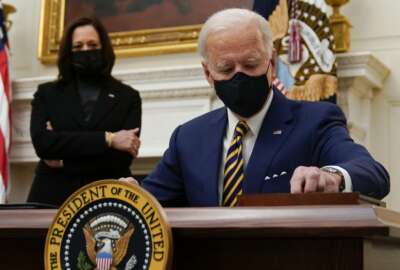Upon taking office, President Joe Biden quickly released a national strategy to deal with COVID-19. That plan included the continued use of the Defense Production Act for expanding the manufacturing and purchasing of vaccines and other coronavirus-related items.
The act, which dates from the Truman administration, has been brought up a lot lately as the United States tries to get its arms around the coronavirus pandemic. Analysts familiar with Pentagon contracting and DPA authorities said they expect the Biden administration to ramp up its use much more in the coming year.
“There were significant DPA actions that happened in the past year under former President Trump, although they tailed off after the immediate crisis,” Andrew Hunter, a senior fellow at the Center for Strategic and International Studies, said in an interview for Federal News Network’s On DoD. “You won’t see that that tailing off with the Biden administration. It seems determined to use a DPA aggressively initially, and on a continuing basis, until they’re convinced that the crisis is truly passed.”
The DPA gives the government authority to direct companies to make products in the interest of national security. In the past, it’s been used to make things like MRAPs quickly to protect troops from explosives in the Middle East.
“It’s a really powerful authority,” said Jerry McGinn, executive director of the Center for Government Contracting at George Mason University and former Defense Department principal deputy director for manufacturing and industrial base policy.
Former President Donald Trump first invoked the act at the beginning of the pandemic to rush ventilators and PPE. Now, with Joe Biden at the helm, DPA use is likely to be different and more targeted.
Trump’s DPA usage
“Former President Trump used DPA in a strange way,” McGinn said. “He used it essentially to direct companies like GM to build the ventilators. It was more of a negotiating tactic than as an authority in my view.”
In April and May, the government’s use of DPA shifted toward increasing pharmaceutical production by building vaccine injectors and other vaccine instruments.
“The focus shifted a bit,” Hunter said. “They focused less on testing, and less on allocating PPE and decided to leave that primarily to the states. The federal government focused more on the vaccine. But, it was something that didn’t exist yet when they turned their attention to it in the first half of 2020. The Defense Production Act is primarily about expanding existing production, or allocating production that already exists. In the case of the vaccines, there wasn’t production, so they moved in a different direction. They started using other things like other transaction authority agreements to spur vaccine development and vaccine production.”
Ramp up of usage under Biden
Both McGinn and Hunter think the Biden administration will take full advantage of the DPA to get vaccines out as quickly as possible and to continue prevention of the disease.
“I think what the Biden administration’s steps are about is creating a more federally directed response to COVID and expanding the scope of what the federal government is working on to give more support to the states with testing and PPE,” Hunter said.
Hunter added that Biden is putting more pressure on the federal government’s responsibility for solving the coronavirus crisis rather than the individual states.
“The idea is federal government takes primary and central responsibility,” he said. “Former President Trump articulated multiple times that we needed to endure this, but eventually, the crisis would pass and it would pass a little bit on its own. They did engage in activities with the DPA to try and deal with the crisis on a month to month basis, but there was always this sense that the solution was not a government solution.”
Hunter said the Biden administration will use its DPA powers because it feels that coronavirus will be beat back by a concerted government effort.
“They’re not just going to say ‘Okay, once all these vaccines are distributed and we’ve got 70% of the population immunized then the government can dust their hands off and job done,’” he said. “They’re going to continue to focus on surveillance of the various variants to ensure that they can follow up the vaccine because we don’t know at this point how long the protection the vaccine provides will last. They’re going to be looking at this as a multiyear effort that isn’t going to be over anytime soon.”
McGinn said he expects more projects coming out of the Biden administration focused on the vaccine, especially when it comes to rushing contracts.
He added that if the government for some reason feels the vaccine production is not meeting the needs of the nation then the DPA may be used as a tool to push the private sector.
“I’m not sure that they will need to do that though because we already have two vaccines in production,” McGinn said. “The two companies are on contract to deliver enough vaccine doses that 200 million Americans will be inoculated by July.”
Copyright
© 2024 Federal News Network. All rights reserved. This website is not intended for users located within the European Economic Area.
